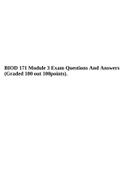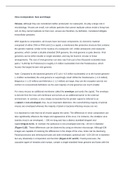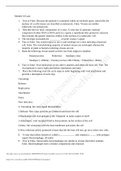BIOD 171 module 6 Virus Composition: Size and Shape (BIOD171)
Portage Learning
All 4 results
Sort by

-
BIOD 171 Essential Microbiology Portage Learning Module 3 Exam Questions And Answers (Graded 100 out 100points), BIOD 171 Module 6 Exam Review Virus Composition: Size And Shape, BIOD 171 Essential Microbiology Lab8 exam, BIOD 171 Essential Microbiology La
- Package deal • 5 items • 2022
-
- $30.49
- + learn more
BIOD 171 Essential Microbiology Portage Learning Module 3 Exam Questions And Answers (Graded 100 out 100points), BIOD 171 Module 6 Exam Review Virus Composition: Size And Shape, BIOD 171 Essential Microbiology Lab8 exam, BIOD 171 Essential Microbiology Lab9 exam & BIOD 171 Essential Microbiology Final Exam 2022.

-
BIOD 171 Module 6 Exam Review Virus Composition: Size And Shape.
- Exam (elaborations) • 10 pages • 2022
- Available in package deal
-
- $8.49
- + learn more
BIOD 171 Module 6 Exam Review Virus Composition: Size And Shape. Question 1 0 / 0 pts Your Answer: Can viruses be classified as either prokaryotic or eukaryotic microorganisms? No. They are neither. No. Viruses are neither prokaryotic nor eukaryotic. Question 2 0 / 0 pts Your Answer: What is an obligate intracellular parasite? 9/6/2020 M6: Module 6 Review: Essential Microbiology with Lab- Zangus It's an organism that can't replicate by itself - a virus is an example of one. As an ...
ALL ABOUT BIOD 171 Module 6 COMMBINED TEST QUESTIONS AND ANSWERS PLUS LAB RESULTS

-
BIOD 171 module 6 Virus Composition: Size and Shape
- Exam (elaborations) • 16 pages • 2021
- Available in package deal
-
- $7.99
- + learn more
BIOD 171 module 6 Virus Composition: Size and Shape Virus Composition: Size and Shape Viruses, although they are considered neither prokaryotic nor eukaryotic, do play a large role in microbiology. Viruses are small, non-cellular particles that cannot replicate unless inside a living host cell. As they cannot replicate on their own, viruses are therefore, by definition, considered obligate intracellular parasites. With regards to composition, all viruses have two basic components: (1) Geno...

Did you know that on average a seller on Stuvia earns $82 per month selling study resources? Hmm, hint, hint. Discover all about earning on Stuvia



